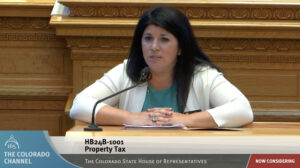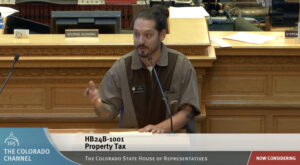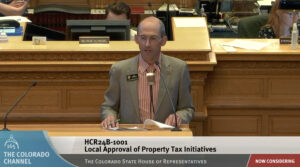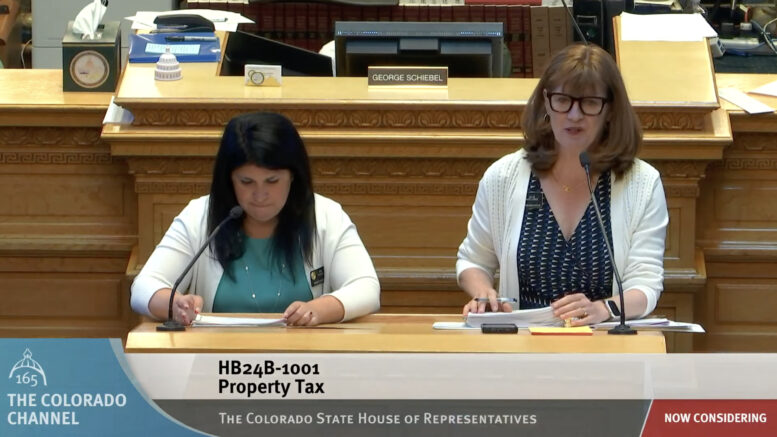Sponsors of the special legislative session’s centerpiece property-tax-reduction bill amended it to make it easier for local governments to grow more quickly after economic slowdowns but otherwise fended off changes during a lengthy debate on Tuesday.
House Bill 1001, which expands property-tax breaks granted earlier this year while capping the annual growth of property-tax revenue going to school districts, received preliminary approval Tuesday in advance of its final House vote on Wednesday morning. Proponents of two more far-reaching ballot initiatives have not commented on the measure, but it appears the bill will make it through the chamber in a similar enough form to how it was introduced that it won’t derail a deal to get them to nix their ballot measures if it passes.
That deal was invoked repeatedly during debate Tuesday, most often by majority Democrats who pilloried Advance Colorado and Colorado Concern, the groups behind Initiatives 50 and 108, for forcing them to make further revenue cuts. And some of the harshest critics attempted to rewrite the bill so that it removed education-funding limits further, eliminated property-tax reductions for second-home owners and gave larger breaks to lower-value homes, though House leaders rebuffed each effort.
A softening of property-tax revenue caps
What remains, then, is a bill that will reduce residential tax-assessment rates to 6.25% for money going to local governments and 7.05% to money going to school districts, with homeowners allowed also to reduce taxable value 10% up to a maximum of $70,000. It will cut commercial and agricultural assessment rates to 25%, just like a law passed in May, and cut assessment rates for vacant land and state-assessed utilities to the same level. And it will cap statewide growth in property-tax revenue at 5.25% for local-government funds and 6% for school-district funds, exempting revenue from new construction and money already set aside for bond repayments.
House Speaker Julie McCluskie, the Dillon Democrat cosponsoring HB 1001 with Republican House Minority Leader Rose Pugliese of Colorado Springs, made one change to give more flexibility to local leaders to recover from slow-growth years.
The amendment permits governments that don’t reach their caps over two-year assessment cycles — 10.5% for local governments and 12% for school districts — to carry over their space under the cap for one more two-year cycle and receive revenues up to that amount. So, for example, if a school district grew property-tax revenues only 7% during one two-year cycle, it could carry over the extra 5% and grow revenue 17% in the next cycle.
Pugliese, who has faced pushback from the most conservative members of her caucus, explained that she backed the amendment and the bill because she thinks it strikes the right balance to help Colorado residents and protect local governments. The former Mesa County commissioner said that the bill creates certainty for governments that are closest to their citizens, protects property-tax breaks now given to senior citizens and permits local governments to ask voters to opt out of caps if needed.
What the bill will mean to property owners

Colorado House Minority Leader Rose Pugliese explains her support for a property-tax bill on Tuesday.
“Certainty is the reason my name is on this bill,” Pugliese said. “I also think the policy is a good policy — not perfect, but a good policy.”
HB 1001 adds another $247.7 million in tax breaks to the $1.3 billion in breaks legislators created through the bipartisan Senate Bill 233 at the end of this year’s regular session. Homeowners who got average reductions in property-tax bills of about $500 because of SB 233 will see another $80 in discounts with this, based on an average mill levies statewide, explained Sen. Chris Hansen, the Denver Democrat cosponsoring the bill in his chamber.
Initiative 108, in comparison, would reduce residential tax-assessment rates to 5.7% and nonresidential rates to 24% and generate some $2.4 billion in savings, while Initiative 50 would cap statewide property-tax revenue growth at 4% annually. Legislative economists estimated that in addition to taking money from local governments, this would require the Legislature to divert some $1.7 billion in backfill to those governments, leading to funding cuts for state programs including higher education and Medicaid.
Under a deal outlined in a letter signed Monday by the leaders of Advance Colorado, Colorado Concern and the Denver Metro Chamber of Commerce, the organizations agreed to withdraw the two initiatives from the ballot if the agreed-upon legislation is signed. And they agreed not to pursue ballot measures to reduce assessment rates or cap revenue growth for six years if state officials don’t go back on the agreement by raising assessment rates or caps or by “changing the non-biased ballot language to opt out of the caps.”
Democrats, some GOP push back on property-tax deal
Frustration boiled over among some legislators Tuesday that they felt they were, as Democratic Rep. Steven Woodrow of Denver said, brought into special session “with the proverbial gun to our head (to) make a bad deal.” Several — particularly Rep. Tammy Story, D-Evergreen — said the further cuts will decimate wildland fire districts to the point that makes the deal untenable, while other Democrats said the deal gives tax breaks to the wealthy while cutting needed school funding.
“We’re here because of special interests seeking to get tax breaks for themselves,” said Rep. Tim Hernandez, a Denver Democrat and educator who is a renter. “It’s real hard to care about property taxes when you don’t make enough money as a public-school teacher to own property.”

Colorado state Rep. Tim Hernandez speaks Tuesday against a proposed property-tax deal.
GOP Reps. Scott Bottoms and Ken DeGraaf of Colorado Springs, who oppose the bill because they want to see the initiatives pass, said Democrats could fund all the services they worry about cutting if they prioritized them over pet projects like electric school buses. And Rep. Rick Taggart, a Grand Junction Republican who supports HB 1001, said that while Democrats are bemoaning what they call cuts, the Colorado Division of Property Taxation showed local governments boosted revenue in 2023 by a cumulative $2.5 billion — 19.4%.
“So how do you come up here and say we don’t have money to pay teachers?” asked Rep. Brandi Bradley, R-Roxborough Park. “We definitely have money to pay teachers. We just don’t choose to.”
In an apparent nod to the concerns of her caucus, McCluskie added one more amendment on Tuesday. It directs the Commission on Property Tax, which was influential in crafting both SB 233 and the latest bill, to continue to look for ways to bring more equity to the state’s property tax structure.
Constitutional amendment still progressing
House members also gave preliminary approval Tuesday to a proposed ballot measure that would ensure local governments sign off on any future statewide property-tax-break changes before they go into law within their borders. But House Concurrent Resolution 1001 has a rougher path to getting to the Senate on Wednesday, as it is a proposed constitutional amendment that needs two-thirds support of the chamber to advance, and it’s not clear all Democrats are on board with it yet.
The measure, which Advance Colorado and Colorado Concern leaders have implied could unravel their deal, is not prescriptive in how it would work, as sponsoring Rep. Mike Weissman, D-Aurora, said he wants legislators to shape details in enabling legislation.
But it would ask local voters if they wanted the right to have to approve any change that impacts their property-tax revenue or spending before a statewide change were to become law there. And, if voters approve that ballot question, it would in some way give them a chance to approve or reject every future statewide property-tax change.
Weissman said HCR 1001 returns control of property-tax levels to the governments that levy and benefit from those taxes rather than the state government, which does not administer property tax. Rep. Jennifer Parenti, D-Erie, asserted that HCR 1001 is the only bill that legislators should be discussing this session, in order to give control of property-tax law back to the governments that should have it.

Colorado state Rep. Mike Weissman explains his proposed property-tax constitutional amendment to the House on Tuesday.
Opposition stronger to property-tax resolution
“Not a penny of what we pay in property taxes goes to the state, yet here we are as a state government debating property tax. I think you should find that a bit odd,” Weissman said. “We are hereby inviting the voters of our state to decide if they want to claim for themselves … who gets to have a say in local taxation.”
Taggart, however, said that allowing each local government to determine whether they follow state law would create a tangled mess of property-tax rates statewide. Rep. Stephanie Luck, R-Penrose, noted that HB 1001 already allows local governments to vote to override statewide revenue caps and questioned if the purpose of HCR 1001 was just meant to make it harder to pass tax relief. And Rep. Gabe Evans, R-Fort Lupton, argued that statewide policy already affects local property taxes by determining, for example, whether it is more difficult to operate oil and gas wells that generate property-tax revenue.
“This is not ready for primetime, and I can’t support it,” Pugliese said.
House Democrats, who hold a 46-19 margin, can muster the 44 votes needed to advance HCR 1001 without any Republican backing, but there are questions on how much support the measure has within the majority caucus. If its passage were to crash the deal to pull down Initiatives 50 and 108, for example, it’s likely that McCluskie and a spate of moderate or more pragmatic Democrats would oppose it.
The special session is scheduled to run at least through Thursday. After the House takes its final votes on the major measures tomorrow, the action shifts to the Senate, which took Tuesday off as it waited for bills to come from the House.
